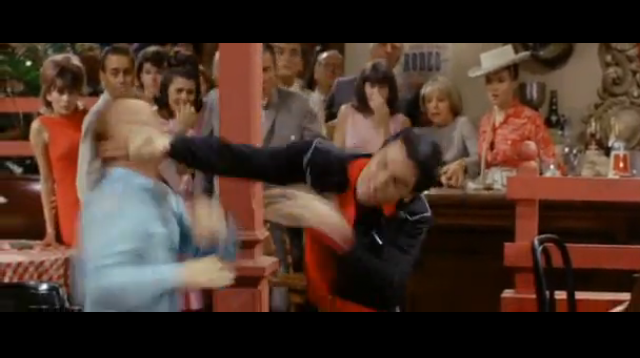About a third into Elvis's carnie flick,
Roustabout, his Charlie Rogers enters the tent of fortune teller Madame Mijanou who claims she look into his eyes and palm and they will "reveal much about love." One needs not be a seer to read into the life of Presley at this point in his film career. His eyes look a little glazed for much of the film, and though often unnaturally tan and made up, his face looks particularly puffy throughout the feature.
Roustabout was Elvis's third film of 1964, and his strenuous schedule under the direction of Colonel Tom Parker led him to a regimen of prescription uppers and downers.
The film doesn't suffer for it (nor did the surprising success of the soundtrack-- one of five Presley albums to rank as a top 100 best selling album of the 1960s), but for the first time in Elvis's movies, we can see that Presley clearly did. Some sources claim he was on diet pills since he used to steal him from his mother and, although he didn't put on the weight that he carried by the time
Paradise, Hawaiian Style came in 1966, in
Roustabout he begins to look worse for wear.
He even slurs some, which is difficult to decipher whether this was Presley's idea of characterization or side effect. His character, however, is one of his most likable ones in the oeuvre, and the difference is subtle. Yes, he still is a bit of a womanizer. Yes, he still makes his career singing in nightclubs (and now, circuses). Yes, he even gets in trouble early, brawling it out in the parking lot (showcasing a bit of his real-life karate training, though it looks pretty funny). The difference is, where earlier Presley films draw him untouchable (
Girls! Girls! Girls!) or worse, entitled (
It Happened At The World's Fair), Charlie Rogers has a bite that isn't excused.
In the opening scene of the film, Charlie takes the stage at the teahouse he works for and is immediately heckled by a table of college students. Elvis trades verbal blows before grabbing his guitar and performing "Poison Ivy League" only to be incitive. A bit of rebel is back, and enough shines through the mostly cliché screenplay to make it enduring. He even adds a provocative pause as he serenades his rivals calling them "sons of... riches", adding just enough edge to make the characterization work. So even when it's apparent that producer Hal Wallis gave specific instruction to "[keep] the screenplays shallow," the darker undercurrent and strong cast allow an emotional resonance to flourish.
Barbara Stanwyck plays carnival owner Maggie Morgan who, while traveling with her employees Joe Lean (Leif Erickson) and his daughter Cathy (Joan Freeman), runs Charlie and his motorcycle off the road. Charlie, though not specified as an orphan, is something of a nihilist with no ties. He joins the carnival while his bike is repaired, and we are introduced to a deep web of melancholy loyalties. "Everybody needs someone to worry about," Charlie is told as he is introduced to the carnival, and it is a trite moral of the film that is drawn more three-dimensionally than you would expect from an Elvis musical-comedy vehicle.
The scenes between Presley and Stanwyck are the highlight, and the hard-edged mother-figure teaches Charlie that he must start "living from the waist up"-- advice that provides character development in a way that sounds trite, but works. Joe Lean leads a tormented life of regrets (one that makes Presley's character in
Fun In Acapulco seem abhorrently amateurish), and his relationship with Stanwyck's Maggie is something of real substance. Strangely, the weakest screen chemistry is between Charlie and his love interest, Cathy.
Upon its release,
Roustabout gathered the reputation of being the weakest set of songs for an Elvis picture yet which is flat out untrue. Nevermind that it was his third highest-selling soundtrack behind powerhouses
Blue Hawaii and
G.I. Blues, I actually prefer
Roustabout to his other musical-comedy full-lengths. The soundtrack features two excellent and nearly forgotten tracks that rank among the best in any Elvis film. "Big Love, Big Heartache" is a melancholy doo-wop-tinged should-be pop hit in a similar vein as The Cascades' "Rhythm of the Rain". Another forgotten gem is "One Track Heart" which ranks among "Crawfish", "Flaming Star" and "Tiger Man" as, though sub-radar, my favorite Elvis songs, bar none.
Around the time Wallis produced
Roustabout he told a journalist, "to do the artistic pictures, it is necessary to do the commercially successful Presley pictures." Presley was none to happy that his musical-comedy doldrums were bankrolling Wallis's shot at Oscar. It appears that Presley was promised, at least by word of mouth, that he could star in
Becket, an historical drama Wallis would also release in 1964 that would win a screenwriting Oscar for Edward Anhalt (
Girls! Girls! Girls!). Wallis built his own bridges and burned them just as fast. Director John Rich even grew tired of Wallis's fiscally-minded operations and, despite not seeing eye to eye with Elvis during
Roustabout, grew to respect his work by the time the two worked together again on
Easy Come, Easy Go (a film that would become the last Presley picture produced by Wallis, as the well finally dried up).
So perhaps that Presley snarl comes with a bit of precedent.
Roustabout is better for it. --
***/four stars
Back to The Films of Elvis Presley
Click Here, Nimrods...
Summary only...




















